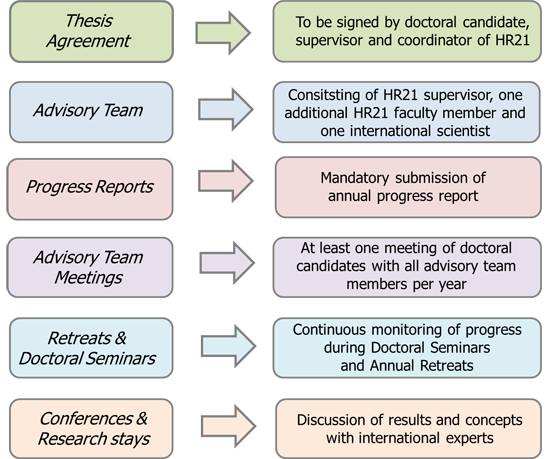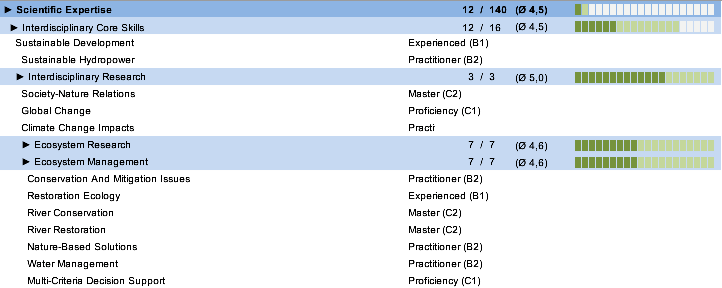MENTORING & MONITORING

Thesis Agreement
Right after admission to the doctoral school a thesis agreement between the doctoral candidate, the supervisor and the coordinator of HR21 has to be concluded and submitted to the BOKU DocService.
In this agreement all rights and duties of both the supervisor and the doctoral candidate are laid down, as well as details about the mandatory course work, rules and extent of monitoring and guidelines for finishing the thesis and the thesis topic.
Advisory Team
All HR21 doctoral candidates are supervised by an advisory team, consisting of at least the supervisor, one additional faculty member of HR21 and one established international scientist in the research area of the doctoral project. Additional members can be appointed and join the team.
Progress Report & Advisory Team Meetings
At least once a year HR21 doctoral candidates have to submit a progress report. In this report doctoral candidates need to describe the advancements in their research project since the last meeting, any challenges that had occurred as well as an outlook of what is planned in the upcoming year. In addition, they need to describe the status regarding their coursework, list all conference and workshop attendances as well as any prizes or awards they have been granted so far. One focus lies on extracurricular activities, such as participation in empowerment courses to support either the important transition from early stage researchers to advanced academic staff or to prepare for a career outside of academia.
This progress report is discussed with all members of the advisory team during the annual advisory team meeting and finally a detailed research plan for the next year is set up. At the end of the meeting, one of the advisors has to talk individually to both the supervisor and the doctoral candidate in order to detect any problems in the supervisor/doctoral candidate relationship as early as possible. In case of severe problems, the Ombuds committee has to be informed.
A short documentation of this annual meeting has to be submitted to the DocService.
Retreats & Doctoral Seminars
Doctoral Candidates frequently present their doctoral research project during both the HR21 Doctoral Seminars and the mandatory Annual Retreat and receive feedback and advice from both the faculty members and their fellow doctoral candidates. In addition, the international advisory board is invited to join and discuss the ongoing doctoral projects during the retreats.
The 3-days Annual Retreats are always held in a seminar hotel outside of Vienna to allow for a more intense get-together in an undisturbed atmosphere. Beside the scientific part, faculty and doctoral candidates discuss further developments of the doctoral programme and set goals for the next year. Additionally, social activities always take place, in order to stimulate the interaction between individuals.
Introduction of a Skills-Map for HR21
A skill map represents the relevant skills, know-how and experience for a department or an organisation. Based on a tree structure, it is possible zoom in from a bigger picture to the details in order to identify different skills. The Skill-Map for HR21 was developed and introduced during a project over a period of six months in 2021. The goals were, among other things, to create a meaningful competence and skill profile (primarily for doc-students) in order to make one's own skills visible and thus also workable. The questions "who knows what" or "who can I turn to with this" should thus be a matter of the past.
In the first step, the core competences from the HR21 area were collected out and summarised in competence clusters. By defining uniform rating scales based on the EQF (European Qualifications Framework), the skills can now also be evaluated and compared objectively.
The entire project was accompanied by Christian Koudela, Smart Organisations, and efficiently implemented with his expertise.

Conferences & Research visits
HR21 doctoral candidates are expected to attend at least one international conference per year, in order to present and discuss their research work with international experts. In addition, the conference participations are the base to start and establish their own professional and international network.
HR21 doctoral candidates are strongly encouraged to go on research stay(s) abroad during their thesis to take the opportunity to experience alternative research cultures, learn new methods & techniques and start international collaborations at an early stage. The existing networks and international collaborations of the HR21 faculty members guarantee a wide range of opportunities for going abroad. Depending on specific project requirements either one continuous or several shorter stays at one or more research institutions are possible.
Rules for awarding the doctoral degree
For being awarded a doctoral degree, the mandatory taught courses (32 ECTS) and the doctoral thesis (148 ECTS) must be completed successfully.
HR21 doctoral candidates have to submit a thesis written in English. For the envisaged cumulative thesis (i.e. article-based thesis), two accepted SCI/SSCI publications as first author are the minimum requirement of the university. Within HR21 we aim to have a third manuscript prepared.
Each thesis is evaluated by two reviewers, at least one has to be from a different organisation than BOKU and HR21 doctoral candidates are asked to preferentially nominate international reviewers. The supervisor cannot act as reviewer. Both reviews have to be positive to be allowed to take the final exam.
The final examination is held as a public event in a defense setting. The defense committee exists of two examiners – again one has to be external, preferentially international – and a chairman. The supervisor is not allowed to be part of the defense committee. The defense starts with a presentation of the doctoral research project, followed by questions by both the examiners and the audience.
Depending on the research field graduates of HR21 are conferred either the degree of Doctor of Natural Resources and Life Sciences ("Doktor/in der Bodenkultur"), in Latin "Doctor rerum naturalium technicarum" (abbreviated as "Dr.nat.techn.") or Doctor of Social and Economic Sciences ("Doktor/in der Sozial- und Wirtschaftswissenschaften"), in Latin Doctor rerum socialium oeconomicarumque (abbreviated as "Dr.rer.soc.oec.").
